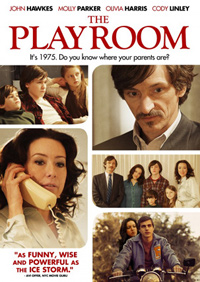Played Out: Dyer’s Sophomore Feature Overly Familiar and Underwhelming
 Director Julia Dyer, again teaming with screenwriter sister Gretchen, mount their first project since their successfully received 1996 independent feature, Late Bloomers, with a 1970s sexual revolution period piece, The Playroom. While there are certain sensational and dramatic elements that may put one in mind of a cross between something like Who’s Afraid of Virginia Woolf? and Flowers in the Attic, the feature, while it certainly avoids camp cliché, also avoids any type of practical engagement with its sordidly unhappy elements. While the adults in the Dyer sisters’ latest feature suffer the children, so do they suffer the patience of an audience desperately searching for a point of interest in the troupe presented to us here.
Director Julia Dyer, again teaming with screenwriter sister Gretchen, mount their first project since their successfully received 1996 independent feature, Late Bloomers, with a 1970s sexual revolution period piece, The Playroom. While there are certain sensational and dramatic elements that may put one in mind of a cross between something like Who’s Afraid of Virginia Woolf? and Flowers in the Attic, the feature, while it certainly avoids camp cliché, also avoids any type of practical engagement with its sordidly unhappy elements. While the adults in the Dyer sisters’ latest feature suffer the children, so do they suffer the patience of an audience desperately searching for a point of interest in the troupe presented to us here.
Opening with a group of four siblings in the Cantwell family, looked after by elder teen Maggie (Olivia Harris), the breaking newspaper headline on the tip of everyone’s tongue happens to be the recent arrest of Patty Hearst, who appears to have been somewhat of a role model for Maggie. As the siblings discuss Patty Hearst’s embittered battle with a broken system and argue that, in reality, Patty’s detractors are the true victims of brainwashing, we soon see the rationale for Maggie’s vehement stance, rooted in the crumbling marriage of her alcoholic parents, Donna (Molly Parker) and Martin (John Hawkes).
As Maggie loses her virginity in the musty Cantwell garage to boyfriend Ryan (Cody Linley), Donna comes home to drink and prepare bacon and eggs for dinner, aware of what’s probably going on in the garage but not inclined to put a stop to it. While mother and daughter exchange conflicted words, dinner also feels overtly tense, as Martin proposes a familiar spelling bee exercise at the table, which may have united the family in the past but now is a cause of discord, with thinly layered intent behind asking one of the children to spell “sanctuary” or asking Donna to spell “matrimonial.” After dinner, the children are ushered to the upstairs eponymous room, where they escape intermittently into a long running fantasy tale about a group of children in “a country where children don’t have to have parents,” coined “Child Land.” Meanwhile, Donna and Martin are having adult night downstairs, having invited over another couple, Clark (Jonathan Brooks) and Nadia Knotts (Lydia Mackay). Except, as more alcohol is consumed, the barely concealed affair that Donna’s having with Clark soon surfaces, transpiring in several heated exchanges which the children witness from upstairs, leading Maggie to make a decision that may alter her future.
The film’s most awkward executions at first most evident in its pains to constantly inform us of the intriguing time in which it is set soon boil over into actual mechanics of the narrative and the lack of subtlety in Dyer’s film soon transcends the details. In place of actual characters, we instead have concepts and sketches of actual characters, and even the more expert cast members are unable to transcend the lack of characterization in the screenplay. While Hawkes steals an actual moment here and there, particularly in his wearied exchange with his children (though, truth be told, the dependence on the importance of spelling as a motif wears thin quickly, especially when it’s revealed that the elder daughter won a spelling bee with ichthyophagous yet can’t figure out habeas corpus), Parker fares worse, a talented actress who gets the showier role but is reduced to cheap comic relief and vague alcoholic tics, either drunkenly enraged or staring vacantly into the distance with smoke curling ceaselessly around her brunette waves. But the cast member that fares the worst is newcomer Olivia Harris, who seems stiff and uncomfortable, her posing stance as awkward as the delivery of her dialogue.
Between Hearst bursts in the dialogue and a poorly utilized Maxine Nightingale sequence, the screenplay never seems to feel quite comfortable with its own setting, which isn’t helped by the numerous interjections of the children’s made up story, constantly beginning with a quiet child voice uttering phrases like “they sailed to the bottom of the world,” and so on. There’s nothing innately noteworthy about the Cantwell’s, and even though Julia Dyer does seem to have an interesting idea concerning the loss of innocence at the hands of unhappy parental figures, anyone familiar with Ang Lee’s The Ice Storm (1997) will most likely find The Playroom to be a derivative carbon copy.


